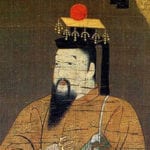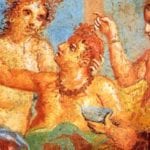 Creepy
Creepy  Creepy
Creepy  Movies and TV
Movies and TV 10 Movies That Get Elite Jobs Right, According to Experts
 Weird Stuff
Weird Stuff 10 Times Real Laws Were Based on Bizarre Hypotheticals
 Animals
Animals 10 Inspiring Tales of Horses Being Human
 Mysteries
Mysteries Top 10 Haunting Facts About the Ghost Ship MV Alta
 History
History 10 Surprising Stories About the Texas Rangers
 Humans
Humans 10 Philosophers Who Were Driven Mad by Their Own Theories
 Miscellaneous
Miscellaneous 10 Video-Game-Worthy Weapons and Armors from History
 Weird Stuff
Weird Stuff 10 Psychics Who Accurately Predicted Wartime Events
 The Arts
The Arts 10 Pieces of Art Inspired by a Broken Heart
 Creepy
Creepy 10 Death Superstitions That Will Give You the Creeps
 Movies and TV
Movies and TV 10 Movies That Get Elite Jobs Right, According to Experts
 Weird Stuff
Weird Stuff 10 Times Real Laws Were Based on Bizarre Hypotheticals
Who's Behind Listverse?

Jamie Frater
Head Editor
Jamie founded Listverse due to an insatiable desire to share fascinating, obscure, and bizarre facts. He has been a guest speaker on numerous national radio and television stations and is a five time published author.
More About Us Animals
Animals 10 Inspiring Tales of Horses Being Human
 Mysteries
Mysteries Top 10 Haunting Facts About the Ghost Ship MV Alta
 History
History 10 Surprising Stories About the Texas Rangers
 Humans
Humans 10 Philosophers Who Were Driven Mad by Their Own Theories
 Miscellaneous
Miscellaneous 10 Video-Game-Worthy Weapons and Armors from History
 Weird Stuff
Weird Stuff 10 Psychics Who Accurately Predicted Wartime Events
 The Arts
The Arts 10 Pieces of Art Inspired by a Broken Heart
Top 10 Horrible Ends Of Roman Emperors
We can all think of current presidents and prime ministers who seem a little out of their depth. Luckily for them the worst that can happen to them is being voted out at the ballot box. For those who rose to the top of the Roman Empire however the end of a political career was often a lot less dainty. If you messed up then there were always those who were willing to replace you, often over your dead body.
Here are ten Roman emperors who suffered horrific downfalls.
Top 10 Little-Known But Fascinating Roman Emperors
10 Vitellius
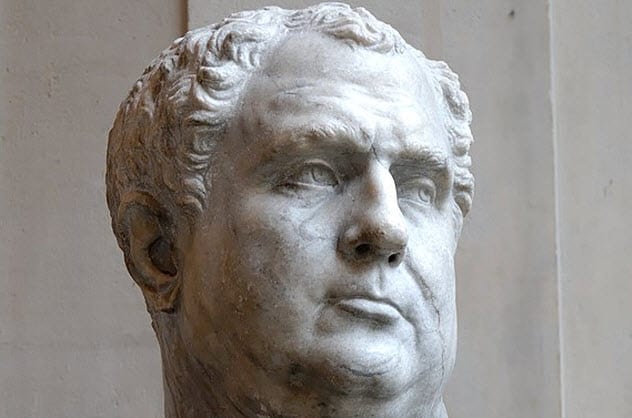
The year 69 AD was an exciting one in Rome. Known as ‘the year of the four emperors’ it saw a number of people gain the imperial throne only to lose their lives soon afterwards. Vitellius was perhaps the most interesting of the figures who donned the imperial purple.
In an age where people spent fortunes on banquets Vitellius out ate them all. One of his proudest creations was the “Shield of Minerva, Defender of the City” – a vast dish made from “the livers of pike, the brains of pheasants and peacocks, the tongues of flamingoes and the milt of lampreys, brought by his captains and triremes from the whole empire, from Parthia to the Spanish strait.” He was also known for snatching bits of food from the offerings made to the gods. Notably absent from his skills was that of soldiering.
His short reign came to an end when Vespasian, declared emperor in the East, turned up in Rome. Vitellius agreed to abdicate in peace when most of his followers abandoned him but the opposing soldiers refused to let him. He returned to his palace to find even the servants had fled. He was dragged from his home and paraded through the streets of the city.
“But they bound his arms behind his back, put a noose about his neck, and dragged him with rent garments and half-naked to the Forum. All along the Sacred Way he was greeted with mockery and abuse, his head held back by the hair, as is common with criminals, and even the point of a sword placed under his chin, so that he could not look down but must let his face be seen. Some pelted him with dung and ordure, others called him incendiary and glutton, and some of the mob even taunted him with his bodily defects.” His last words before execution were “Yet I was once your emperor.”[1]
9 Caligula
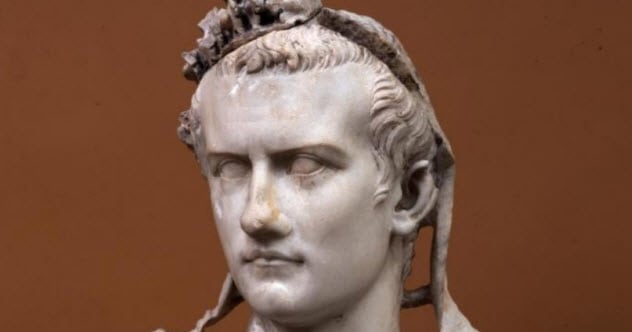
Becoming Emperor at a young age may not be the best start in life. Imagine being just out of your teens with all the power in the world. His position did not escape a young Caligula who told people “Remember, I can do anything I please to anybody.” Raised in the deadly court of the Julio-Claudian family he had seen many close relatives die suspicious deaths which must have affected his stability and made him somewhat paranoid.
Among Caligula’s most famous acts were waging a war against the god Neptune, declaring himself a god, and kissing his wife’s neck before telling her “Off comes this beautiful head whenever I give the word.” Such actions do not tend to make people very loyal to you. When he turned his fondness for deadly jokes on his guards and senators however they decided to cut short the god’s reign.
The conspirators trapped Caligula as he walked between the theatre and the palace and fell on him with swords. One blow severed his jaw and others fell as the emperor slid to the floor. According to Tacitus his last words were “I’m still alive.” Alas he did not have much time left when that would be true.[2]
8 Petronius Maximus
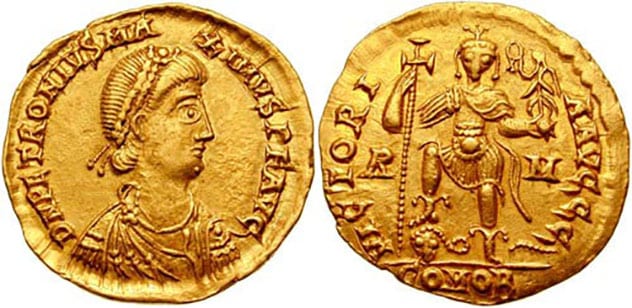
By the 5th century the Roman Empire was in trouble. Large numbers of Goths and other peoples from outside the empire had moved into Europe and were carving out kingdoms of their own. The power of the emperor was constantly being challenged. Yet emperors still had time for other activities like seducing the wives of their officers. When Valentinian made love to the wife of Petronius Maximus he also made a powerful enemy.
Maximus convinced Valentinian’s guard to assassinate him, which they did while the emperor was practising archery. Seeing a nice new job opening Maximus had himself declared the new emperor and married Valentinian’s widow Eudoxia to make himself seem more legitimate. It did not work.
Eudoxia called on the help of the Vandal king Geiseric. He turned up with an army and Maximus’ reign was brought to a minimal end. With news of the Vandal advance Maximus abandoned the city but as he rode away a crowd saw their fleeing emperor and stoned him to death. Three days later the Vandals arrived in Rome, sacked the city, and gave us the modern meaning of the word vandal.[3]
7 Elagabalus
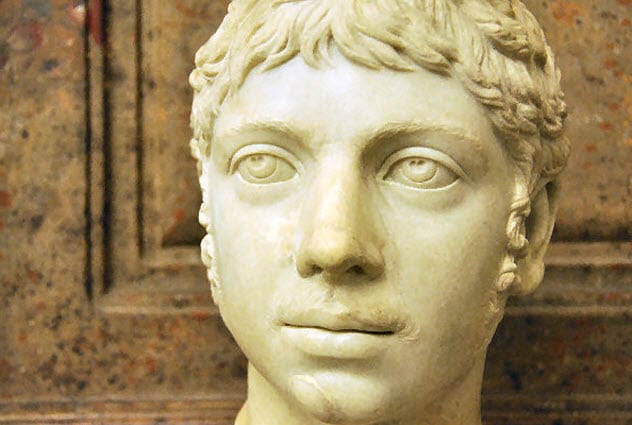
Religion is always a dangerous topic to bring up yet emperor Elagabalus decided to risk bringing a new and foreign cult to Rome. Coming to the throne at the age of around 14 Elagabulus was named because of his position as the chief priest to the Eastern sun god Elagabal. This devotion to a different god was just one reason Elagabalus did not survive for long.
Ascending to the throne because of his blood ties to previous emperors and the influence of his mother and aunt Elagabalus could have enjoyed popular support but his sexual and religious activities made him deeply unpopular. He attempted to have male lovers put in positions of authority, though he also married one of the sacred Vestal Virgins in a sacrilegious ceremony. Vast sums of money were promised to any surgeon who could give the emperor a vagina.
While power makes everyone a little eccentric his activities were a little too much for the Romans. Despite attempts to please his forces the army turned on the emperor. “He made an attempt to flee, and would have got away somewhere by being placed in a chest had he not been discovered and slain, at the age of eighteen. His mother, who embraced him and clung tightly to him, perished with him; their heads were cut off and their bodies, after being stripped naked, were first dragged all over the city, and then the mother’s body was cast aside somewhere or other, while his was thrown into the Tiber.”[4]
6 Commodus
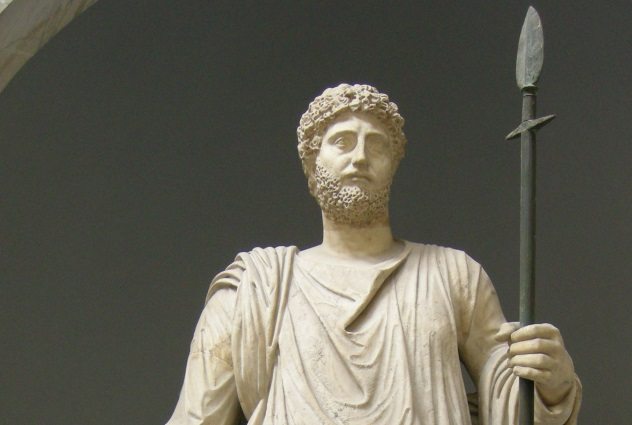
Marcus Aurelius is often held up as one of the wisest people ever to rule. Yet his death brought about the end of a period of calm and peaceful rule. While the previous five “good” emperors had been adopted by their predecessors because of their talent and abilities Marcus Aurelius chose to leave the empire in the brutal hands of his unstable son Commodus.
As soon as Marcus was dead Commodus abandoned his war against the German tribes to rush back to Rome and all the pleasures he could find there. “After he had come back to Rome he led the triumphal procession with Saoterus, his partner in depravity, seated in his chariot, and from time to time he would turn around and kiss him openly, repeating this same performance even in the orchestra. And not only was he wont to drink until dawn and squander the resources of the Roman Empire, but in the evening he would ramble through taverns and brothels.”
Several conspiracies sprang up against the emperor’s life, including one led by his sister. He survived these attempts only to fall to one which his wife took part in. When poison failed to kill Commodus they arranged for one of his favourite athletes to surprise him in his bath. Instead of a happy ending however Commodus was strangled to death.[5]
5 Nero
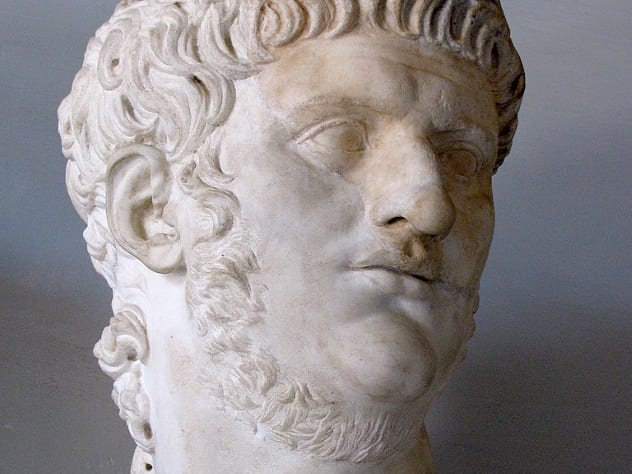
The Julio-Claudians liked to keep power within the family. But then they also liked to keep murder, sex, and intrigue there too. Nero was great nephew to the emperor Claudius but became his adopted son when Nero’s mother Agrippina married him, despite being his niece. When Claudius died it was Nero who became emperor and not Claudius’ son Britannicus. Poor Britannicus soon died in mysterious circumstances and Nero was undisputed ruler.
Despite his mother attempting to influence his rule, supposedly through incest with him, Nero decided he liked his power to be entirely in his own hands. After several botched attempts to kill her Agrippina was finally stabbed to death by one of Nero’s agents. She told her assassin to stab her in her womb as it had given birth to such an unnatural son.
Nero’s rule was given over to his own pleasure and desire to be an artist. When he competed on stage in poetry and singing everyone had to watch him – some men faked their own deaths in the audience to escape his ‘art.’ When several generals rose up against him Nero dithered until it was too late. He spent time arranging his burial plot and seeing how pretty it was remarked “What an artist dies in me.” With the aid of an assistant he managed to drive a dagger into his throat.[6]
4 Joannes
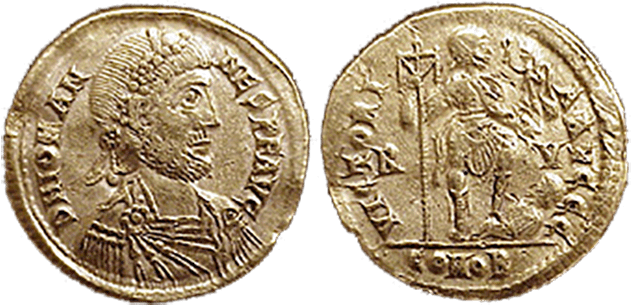
Despite the risks associated with being Roman emperor there were always people who seemed to want the throne. When the emperor Honorius died his son was far away in Constantinople. This power vacuum was filled when Joannes, a high ranking civil servant, claimed the crown.
When the Eastern emperor sent a force to remove Joannes it was defeated and the leader captured. Joannes showed mercy to this man as he hoped to negotiate a peace settlement with the Eastern emperor. This mercy was misplaced as the envoy stirred up a conspiracy against Joannes.
The emperor was captured by his enemies and not shown any mercy. They “brought him out in the hippodrome of Aquileia with one of his hands cut off and caused him to ride in state on an ass, and then after he had suffered much ill treatment from the stage-performers there, both in word and in deed, he put him to death.”[7]
3 Valentinian
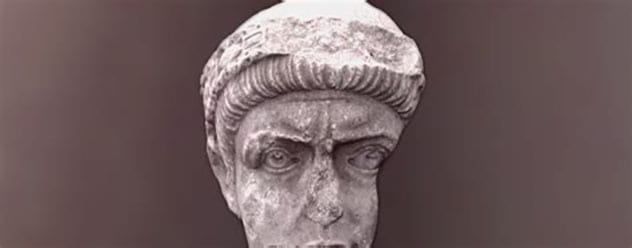
The Roman empire in the 4th century was surrounded by enemies. While the empire was able to keep most of them out the situation required emperors to spend most of their time campaigning in various wars. This could be aggravating – and for Valentinian I it proved so annoying that it killed him.
When a tribe called the Quadi were angered by Romans building forts on their territory they sent envoys to the Romans. The Romans invited the Quadi to dinner to discuss matters – and promptly murdered their guests. This pushed the Quadi into forming alliances and invading Roman lands. This required Valentinian to come in person to crush the invasion.
When the emperor turned up with his army the tribes were soon crushed but, fatally, the emperor agreed to meet with a Quadi representative. When the Quadi refused to accept full responsibility for what had happened (their envoys had been treacherously murdered after all) Valentinian became so enraged with their attitude that a blood vessel in his head spontaneously exploded. The emperor collapsed and died.[8]
2 Carus
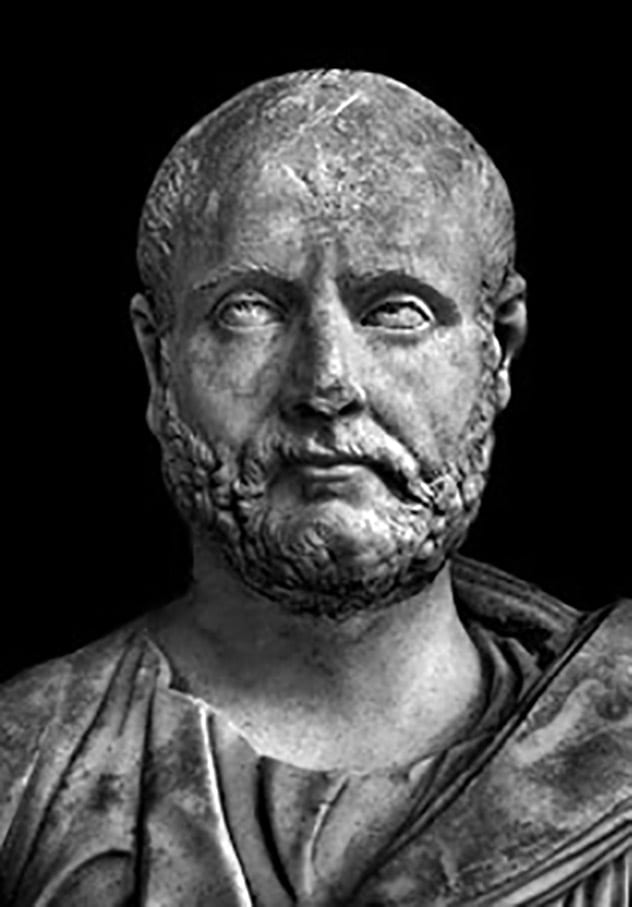
Carus was another emperor who had dealings with the Quadi, though his were rather more successful. After being acclaimed emperor by his troops Carus led victorious campaigns against the German tribes before turning his attention to the Persian empire in the East.
Here too he had brilliant successes. Carus recaptured Mesopotamia as a Roman province and drove further into Persia – despite oracles telling him that he would not go any further. Already ill the emperor retreated to his tent when a thunderstorm blew up. In the night lightning was seen to strike within the army camp. When the emperor’s tent was opened in the morning he was found dead inside, apparently struck by lightning.
This death from above was seen as a sign that the campaign should be abandoned and the Romans marched back the way they came.[9]
1 Valerian
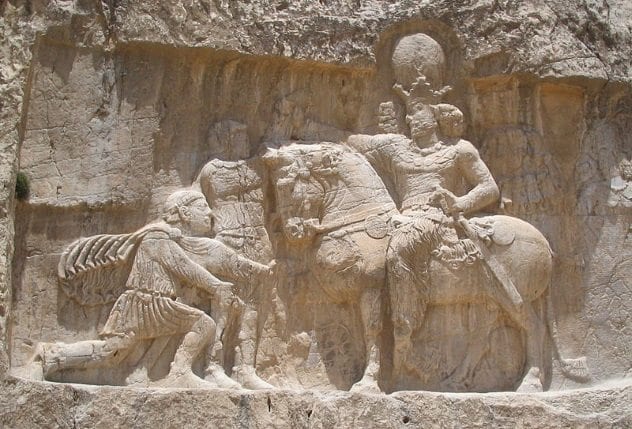
Carus had not been the first Roman emperor to attempt to bring the Persians to heel. With the growing Persian empire threatening much of the Eastern Roman empire many emperors had been forced to wage war against them. Perhaps the most unfortunate was Valerian.
Seeking to recover lost lands he managed to reclaim much that had been taken by the Persians but his army was struck by an outbreak of plague that left him lacking manpower. Despite this Valerian led his men out against the Persian emperor Shapur. At the Battle of Edessa the two armies met – to the complete destruction of the Roman force.
According to Persian inscriptions, which graphically show Valerian being brought before Shapur, the Romans were entirely defeated and captured. For the first time in Roman history an Emperor was captured alive by a foreign enemy. While the captive soldiers were set to work digging water channels in Persia Valerian suffered a worse fate. According to Roman sources “he was flayed, and his skin, stripped from the flesh, was dyed with vermilion, and placed in the temple of the gods of the barbarians.” Others claim that the former emperor was turned into a footstool for the Persian kings.[10]
10 Facts That Show Why Caligula Was Rome’s Craziest Emperor
